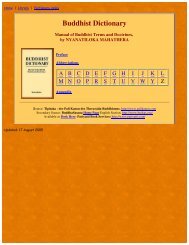Night and Morning with Bhikkhu Tissa
Night and Morning with Bhikkhu Tissa
Night and Morning with Bhikkhu Tissa
- No tags were found...
Create successful ePaper yourself
Turn your PDF publications into a flip-book with our unique Google optimized e-Paper software.
<strong>and</strong> again, in this world or some other world, in pleasant or painful or mixed circumstances, on <strong>and</strong> on. Butevery birth, every particular lifetime, even the most fortunate, is impermanent <strong>and</strong> limited. Every one of theseabodes is a temporary abode.Gene: So there is no permanent rest <strong>with</strong>in saísára.<strong>Bhikkhu</strong> <strong>Tissa</strong>: That’s right. So why—let me ask you—why do you think the Buddha revealed thesetruths? Why did he paint such a picture of the universe?Gene: It might be, to let us see our condition. To give us some motive for improving ourselves.<strong>Bhikkhu</strong> <strong>Tissa</strong>: If we know our true situation <strong>and</strong> if we underst<strong>and</strong> how our own actions result in benefitor misery, then we will be in a position to undertake wholesome actions <strong>with</strong> good will <strong>and</strong> energy. We go onsuffering so long because, not underst<strong>and</strong>ing the true nature of reality, we go on craving for unsubstantial,unreliable things. Our fortune in this life <strong>and</strong> in future lives will be guided by the degree to which we refrainfrom evil <strong>and</strong> actively apply the good <strong>and</strong> try to cleanse our own minds. The ideals the Buddha taught have apractical purpose, you see—to remove suffering, the small <strong>and</strong> the large. We should take a good, critical lookat ourselves <strong>and</strong> at the world <strong>and</strong> then behave intelligently <strong>and</strong> morally. When the Dhamma is rightlypracticed it brings benefit here <strong>and</strong> now. You can see it for yourself.Gene: Venerable sir, this cycle of existence has been going on a long time—<strong>with</strong>out beginning, as Iunderst<strong>and</strong>. Can I really expect to get out of suffering in the future? Or will it continue forever? Can I actuallyreach perfect happiness?<strong>Bhikkhu</strong> <strong>Tissa</strong>: The Buddha discovered the path <strong>and</strong> made it known. But the walking, Gene, depends onyou.Gene: Ah, yes. On me. I guess it does.(Wind gusts suddenly in the trees outside. Lightning flashes, followed by a crack of thunder. Big raindrops begin tosplash on the windowsills <strong>and</strong> spatter through the screens. <strong>Bhikkhu</strong> <strong>Tissa</strong> rises to shut the windows. When he returns tohis seat, both he <strong>and</strong> his visitor remain silent for a few moments while the rain pours down <strong>and</strong> the yard brightens <strong>with</strong>each stroke of lightning.)Gene (slowly): You know, I’m thinking about that dragonfly again. Maybe I saw it wrong. Maybe it wasn’tbeautiful at all, but rather something ferocious <strong>and</strong> terrible—like an embodiment of craving. Or a symbol ofdukkha!<strong>Bhikkhu</strong> <strong>Tissa</strong> (<strong>with</strong> a slight smile): Do you think so?Gene: Well… maybe. But at any rate it seems, venerable sir, that suffering does not have to occur for me inthe future; it may or may not, depending on my actions. I might experience at least some degree of happiness.<strong>Bhikkhu</strong> <strong>Tissa</strong>: Yes. That is an essential principle in Buddhism. Things arise out of conditions. Suffering isa result of craving; suffering arises <strong>with</strong> craving as a base or condition.Gene: Yet it’s almost an automatic process—craving <strong>and</strong> suffering again <strong>and</strong> again.<strong>Bhikkhu</strong> <strong>Tissa</strong>: Automatic, maybe, the way we usually live, but not fated or absolutely determined.Gene: What is the distinction?<strong>Bhikkhu</strong> <strong>Tissa</strong>: The Buddha did not teach fatalism—the idea that our experiences are inevitable <strong>and</strong> fixed,that we will have to undergo helplessly certain pains or pleasures. And, on the other h<strong>and</strong>, he did not describethe universe as uncaused or accidental. Instead he explained how phenomena arise <strong>and</strong> last only as long astheir supporting conditions are present. We living beings make choices <strong>and</strong> commit actions that provide theconditions for later happiness or misery. Although we habitually or even automatically give way to craving<strong>and</strong> other unwholesome tendencies <strong>and</strong> consequently experience suffering, we don’t have to.Gene: So an escape from the wilderness of saísára is possible.<strong>Bhikkhu</strong> <strong>Tissa</strong>: Yes. But even <strong>with</strong>in the round of birth <strong>and</strong> death, right <strong>with</strong>in this very life, we canreduce suffering <strong>and</strong> gain increasing peace of mind <strong>and</strong> happiness through good actions. Again, it depends onour actions.Gene: You’re just not going to let me off the hook, are you? It’s my responsibility.8
















